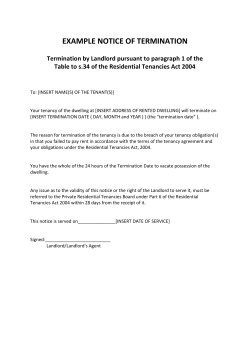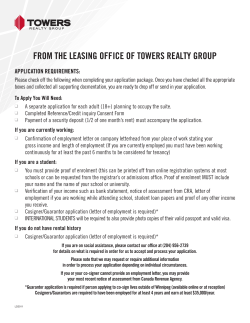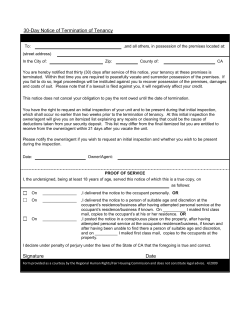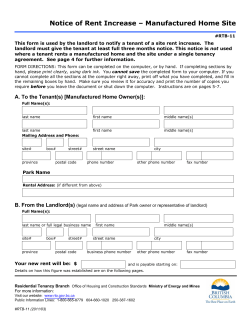
Document 30096
DISCLAIMER: While making every attempt to present general legal information accurately in this publication, Tenants Advice Service claims no liability for any loss or damage arising from its use. This publication should not be relied upon as a substitute for legal or other professional advice. 3.8 When the Tenant is in Breach of the Agreement What is a Breach of the Agreement? Being in breach of your agreement means you have broken one or more of the rules of your tenancy agreement (lease) with the owner/agent. A tenancy agreement may be verbal or written or a combination of both. The tenancy agreement sets out the rules (conditions) that you and the owner/agent have agreed to. These rules (conditions) must follow the Residential Tenancies Act (1987) WA. Sometimes conditions that are verbal (not written into an agreement) can also count as rules (conditions). Some sections of the Act can be changed by a ‘contracting out’ clause being put in the written tenancy agreement. Other provisions of the Act cannot be changed and may apply even if your tenancy agreement has a different clause written in it. See chapters 1.03 The Residential Tenancies Act and 2.08 The Tenancy Agreement for more information. If you breach the agreement, the owner must take certain steps before they can end your tenancy. What is a Notice of Breach of Agreement? The Notice of Breach of Agreement is the written notice the owner/agent may give you if you have broken any of the terms or conditions of your tenancy agreement. This breach notice can be on a standard form such as a Form 20: Notice of Breach of Agreement (by tenant) or a Form 21: Breach Notice for Non‐Payment of Rent or it can be just a letter, but it must be in writing if the owner wants to take any further action against you. The breach notice must give you details of what the owner claims you have done to breach your agreement and give you time to remedy (fix) the breach. The time given must not be less than 14 days. A breach notice must give you at least 14 days to fix the problem. What if the breach notice is about rent arrears? If you fall behind in the rent (this is called being in rental arrears) do not ignore the problem! Contact the owner/agent immediately to explain your financial situation and see if you can negotiate an agreement to pay the arrears in affordable instalments. Put this agreement in writing and make sure that you and the owner/agent sign it. There are two alternative options for an owner/agent wanting to take action against a tenant in rent arrears. See chapter 3.02 Rent Arrears for more information. What if the breach notice is for something other than rent arrears? The owner/agent can issue a breach notice (a standard form such as a Form 20: Notice of Breach of Agreement (by Tenant) or Form 21: Breach Notice for Non‐Payment of Rent or a written letter) as soon as they think you have breached a part of your tenancy agreement. The breach notice must tell you that you have not less than 14 days to fix the problem. If you do not fix the problem within the time given, the owner/agent can issue a Form 1C: Notice of Termination (see section on Notices further on; also see chapter 4.03 Ending the Tenancy when the Tenant Breaches the Agreement). Fixing the breach after the time given in the Breach Notice does not stop the owner from issuing a Form 1C Notice of Termination. Tenants Advice Service ‐ Tenants Rights Manual March 2010 | Infosheet 3.08 | Page 1 Should I respond to the Breach Notice? Yes. If you are in breach and can fix the problem, you should let the owner know straight away. When you receive a Form 20: Notice of Breach of Agreement (by Tenant) or Form 21: Breach Notice for Non‐ Payment of Rent, it is a good idea to send the owner/agent an immediate written response. You don’t have to, but it is useful to have your side of the story documented, just in case the issue becomes a dispute further down the track. Always keep a copy of your letter so it can be used later as evidence if necessary. See chapter 3.13 Writing a Letter to the Owner/Agent for more information. What if I want to fix the problem? If you have breached the agreement and are willing, or able, to fix the breach, you should do so within the given time and/or inform the owner/agent that you intend to fix the problem. Always keep copies of any letters sent to and from the owner/agent. What if I can’t fix the problem within the time given? If you accept you have breached the agreement, but are unable to fix the problem within the given time, write to the owner/agent and if appropriate, explain why. Try to reach agreement on when the problem can be fixed. Be aware that the owner/agent does not have to extend the time given to fix the breach. They may serve you with a Form 1C: Notice of Termination if the breach is not fixed in the time given. What if I don’t agree there is a problem? Respond to the owner/agent in writing explaining your reasons if you don’t agree with the owner/agent’s claims that you are breaching the agreement. For example, if the owner/agent says you have breached the agreement by keeping a dog, but you don’t have a dog; or you do have a dog but your agreement doesn’t say you can’t. See chapter 3.13 Writing a Letter to the Owner/Agent for more information. What can the owner do if I don’t fix the breach? The owner/agent may give you a Notice of Termination if you don’t fix the breach within the time given (not less than 14 days). The Notice of Termination must be in the right form; this may be one of three forms depending on the type of breach (see section below). The Notice of Termination is not legal if it is not in the correct form. This means it can’t be enforced and you do not have to move. How do I know I’ve been given the right Notice of Termination? • Form 1A – The owner/agent can give you a Form 1A if you are in rent arrears and were given a breach notice but didn’t pay the rent owing in the given time (Residential Tenancies Act, s.62 (4)). Paying rent after the Form 1A notice has been issued doesn’t stop the owner from continuing with their action of going to court. See also chapter 3.02 Rent Arrears. • Form 1B – The owner/agent can give you a Form 1B if you are in rent arrears and they have not given you a breach notice about the rent arrears already. A court hearing may be requested by the owner to order you to pay the rent owing and terminate your tenancy. However, under this notice the owner/agent must stop their action of going to court if you pay the rent owing at any time up to one day before the date of a court hearing (s.62(5)(a)). You must also pay the owner the cost of the Tenants Advice Service ‐ Tenants Rights Manual March 2010 | Infosheet 3.08 | Page 2 court application one day before the hearing to stop the owner’s action (s.62(5)(b)). See also chapter 3.02 Rent Arrears. • Form 1C – The Form 1C can be given if there are other reasons (apart from rent arrears) for the owner wanting to end your tenancy. See chapters 4.01 Ending a Periodic Tenancy and 4.02 Ending a Fixed Term Tenancy for more information. A Notice of Termination will tell you that you have to move out, but this does not necessarily end the tenancy agreement. A Notice of Termination is NOT an Eviction order Even though a Notice of Termination will tell you that you have to move out by a certain date, the Notice is NOT an Eviction Order. If you receive a Notice of Termination, you can stay until the owner applies to court and a decision is made about your situation. You should go to court and tell your side of the story to the court and explain why you think your tenancy should not be terminated. See chapters 6.02 Preparing for Court and 6.03 Going to Court for more information. Also see chapter 4.07 Evictions for more about eviction orders. The Notice of Termination is NOT an Eviction Order. What happens if I move out after getting a Notice of Termination? If you have a periodic tenancy, the owner/agent may claim compensation if they suffer any loss as a result of you breaching the agreement. For example, up to three weeks rent in lieu of notice or until new tenants move in (whichever is less). Also see chapter 4.01 Ending a Periodic Tenancy. If you have a fixed term tenancy agreement, you may have to pay rent up to the date specified in the agreement or until the property is re‐let. You may also have to pay any extra costs such as advertising incurred as a result of breaking the agreement. See chapter 4.02 Ending a Fixed Term Tenancy for more information. It is illegal for any owner to evict a tenant without a court order. Penalty : $4000. What if I want to stay? If you receive a Notice of Termination, you can stay until the owner applies to court and a decision is made about your situation. You should go to court and tell your side of the story to the court and explain why you think your tenancy should not be terminated. See chapters 6.03 Preparing for Court and 6.04 Going to Court for more information. List of Tenants’ Rights Manual chapters referred to in this info sheet: • • • 1.03 The Residential Tenancies Act 2.08 The Tenancy Agreement 3.02 Rent Arrears Tenants Advice Service ‐ Tenants Rights Manual March 2010 | Infosheet 3.08 | Page 3 • 3.13 Writing a Letter to the Owner/Agent • 4.01 Ending a Periodic Tenancy • 4.02 Ending a Fixed Term Tenancy • 4.03 Ending the Tenancy when the Tenant Breaches the Agreement • 4.07 Evictions • 6.03 Preparing for Court • 6.04 Going to Court Samples of the forms referred to in this information sheet can be viewed on the TAS website: www.taswa.org, or downloaded from the Department of Commerce website: www.commerce.wa.gov.au. Sample Letters DISCLAIMER: The following is a sample letter only. You should write your own letter telling your own story in your own words (See Chapter 3.13 Writing a Letter to the Owner/Agent for information on writing your own letter). Mr P Owner 15 Hill Street West Coast WA 6666 1 February 2010 Mr Owner ** WITHOUT PREJUDICE Re: Breach Notice I am in receipt of your breach notice dated 29 January 2010. Please accept my apologies for the damage to the washing line. My son has learned his lesson and he will not climb on it again. I do recognise that it is my responsibility to repair the line. I had intended to repair it and I regret the delay. Please be assured that I have every intention of fulfilling my obligations, and that the line will be repaired within the next week. I trust this will be acceptable to you. Yours faithfully, Mrs J Tenant 136 Resident Street Newtown WA 6666 Tenants Advice Service ‐ Tenants Rights Manual March 2010 | Infosheet 3.08 | Page 4 DISCLAIMER: The following is a sample letter only. You should write your own letter telling your own story in your own words (See Chapter 3.13 Writing a Letter to the Owner/Agent for information on writing your own letter). Mr P Owner 15 Hill Street West Coast WA 6666 1 February 2010 ** WITHOUT PREJUDICE Mr Owner Re: Breach Notice I am in receipt of your breach notice dated 29th January 2010. I am sorry I have not yet paid my water account. I had intended to pay it by now. I rang your office last week and explained I had an unexpected problem and that I hoped to pay it from my next pension payment. I write to ask whether you would be agreeable to me paying the account in two payments. This would make it easier for me and help me to ensure that I don't end up short again before my next rent is due. I could make the first payment of $35 on Thursday. I look forward to receiving your response. Yours faithfully, Mrs J Tenant 136 Resident Street Newtown WA 6666 ** PLEASE NOTE: You may choose to write ‘Without Prejudice’ on a letter to the owner/agent, however you need to understand the legal implications of doing so. ‘Without Prejudice’ is a statement made without an intention to affect the legal rights of any person. This means you can write a letter using ‘Without Prejudice’ and it cannot be used in court as evidence against you. You can still bring the letter into court but you cannot give it to the Magistrate as evidence. You can verbally refer to it but only to show that you tried to negotiate a solution to the problem. You may decide to not write ‘Without Prejudice’ in your letter if you think you may want to present the letter in court as evidence. Tenants Advice Service ‐ Tenants Rights Manual March 2010 | Infosheet 3.08 | Page 5
© Copyright 2025





















